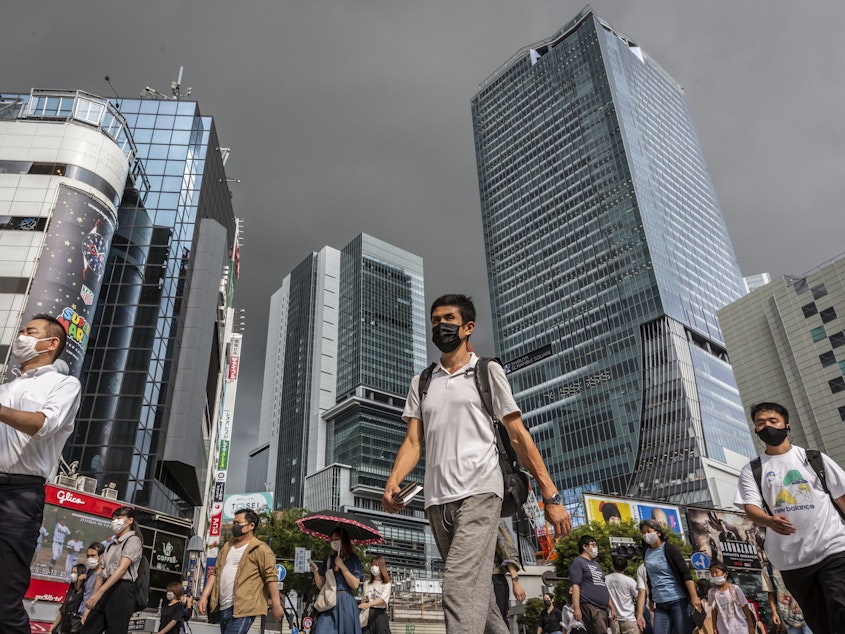Record-Breaking COVID-19 Cases Lead Olympic Host Japan To Expand A State Of Emergency

Japan extended a state of emergency to areas around the capital, Tokyo, and to its second largest city, Osaka, on Friday, following a record-setting surge in COVID-19 cases.
Japan saw new COVID-19 cases surpass 10,000 for two days in a row, while Tokyo cases broke records for three days in a row through Thursday. The capital's seven-day rolling average jumped 80.5% over the previous week.
The number of hospitalized COVID-19 patients has doubled over the past month, and experts estimate that the current fifth wave of infections still has a week or two to go before reaching its peak.
Following requests from local officials, the central government extended the emergency to Chiba, Saitama and Kanagawa prefectures, bordering Tokyo, in addition to Osaka. The emergency will run from Monday through the end of August.
An emergency already in effect in Tokyo and the island prefecture of Okinawa will be extended from its current end-date of Aug. 22nd through until the end of the month. And five other prefectures, including the northernmost island prefecture of Hokkaido and the Kyoto and Hyogo prefectures near Osaka, will go under looser quasi-emergencies.
Sponsored
Opinion polls have shown Japanese respondents are not convinced by official reassurances that the Games will not spread the coronavirus to the general population. Prime Minister Yoshide Suga insists that the Games have nothing to do with the spike in infections and that canceling the games, which began a week ago, is not an option.
As in other countries, emergencies and other social distancing measures are becoming less effective at keeping Japanese citizens at home; as a proportion of cases, the highly infectious delta virus has been growing, and vaccinations are failing to keep pace.
Experts say tougher measures are needed.
"I feel a great sense of danger," Dr. Shigeru Omi, the government's top COVID-19 adviser said Thursday. "There is barely any prospect that we can curtail this outbreak."
"The medical care system is on the brink of the collapse in some areas," Kanagawa Governor Yuji Kuroiwa warned. An increasing number of COVID patients in Tokyo and elsewhere are unable to get hospital beds, and await treatment at home.
Sponsored
Tokyo Governor Yuriko Koike has urged the capital's young people to get vaccinated, but a shortfall in supply means that many young people who want the jabs can't get them. Just over a quarter of the population has been fully vaccinated.
The current emergency has reduced pedestrian traffic, but to a lesser degree than the previous one. Like the three previous emergencies, this one simply requests bars and restaurants serving alcohol to shut down.
But a government plan to punish pub owners who failed comply by telling wholesalers to cut off their supply of liquor backfired, resulting in some bars openly flouting restrictions. [Copyright 2021 NPR]



